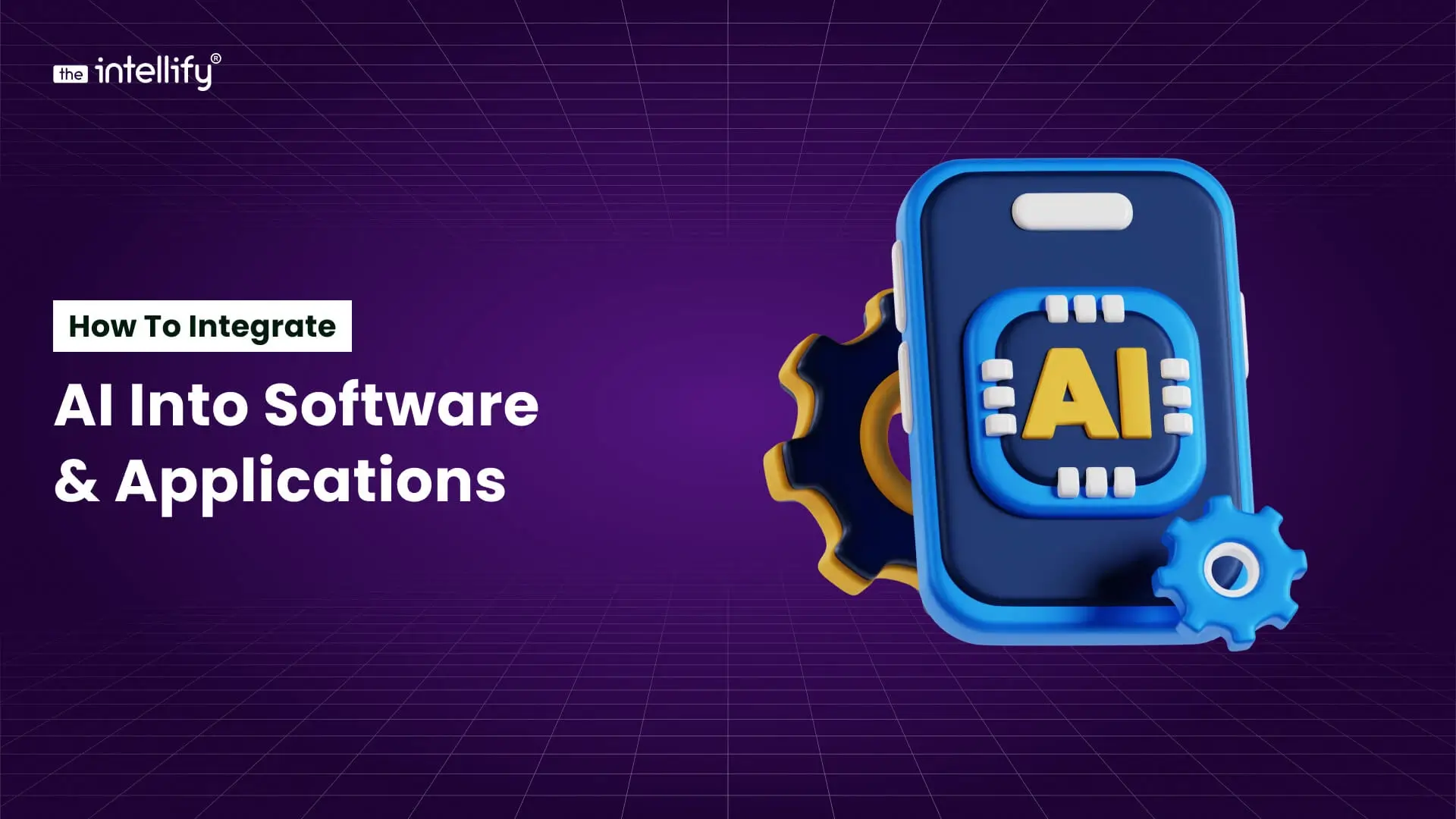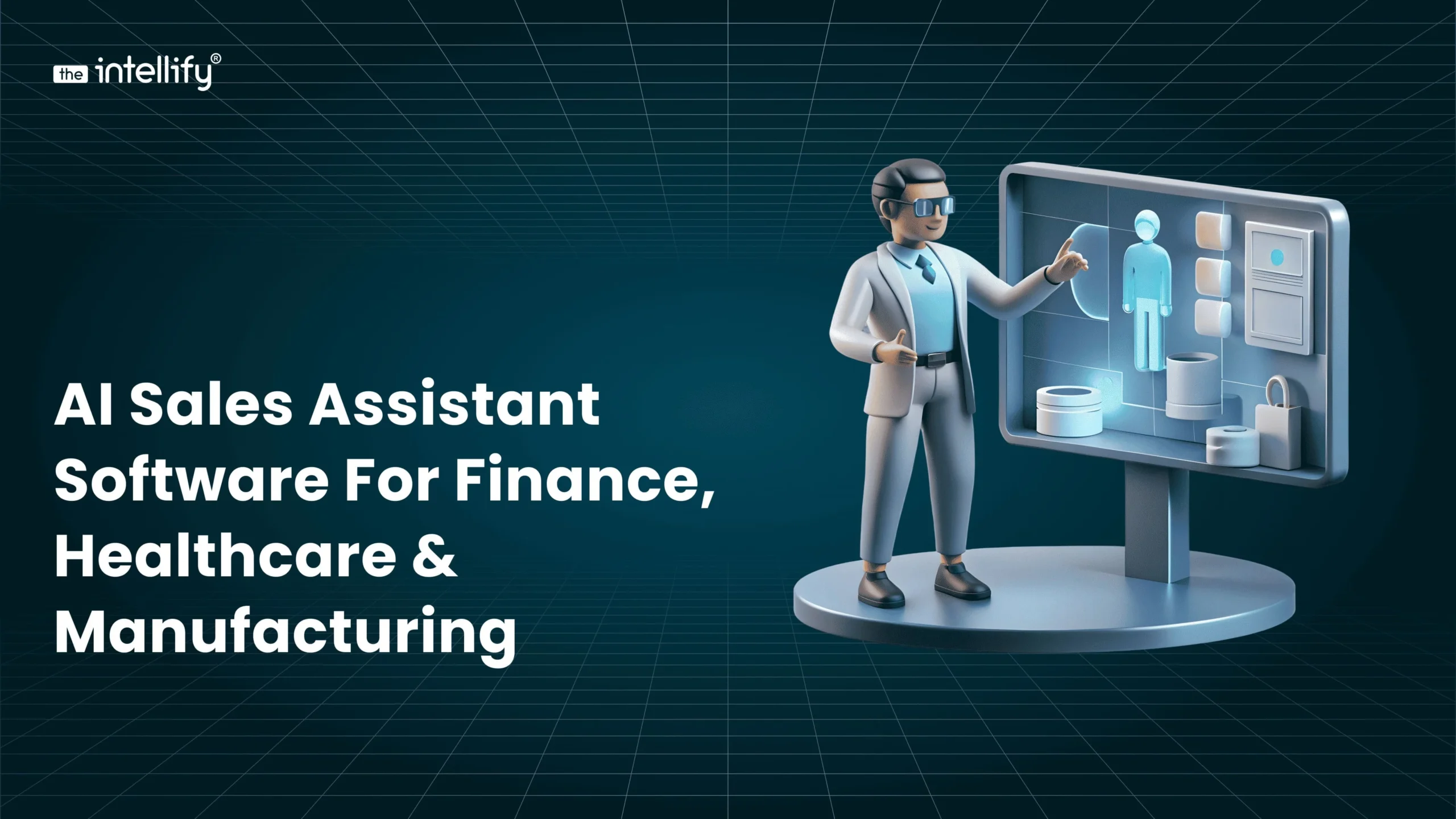Summary
This guide explains how to integrate AI into software and applications with practical steps. The blog highlights common challenges, best practices, and real-world applications across industries. Whether you are a developer, business owner, or technology strategist, this guide provides actionable insights to build smarter, more efficient, and user-friendly software solutions.
Artificial Intelligence (AI) is no longer just a futuristic concept, it’s actively transforming software and applications across industries. From improving user experiences to optimizing operations, AI has become a critical component for businesses aiming to stay competitive.
Whether you’re developing a mobile app, enterprise software, or a web application, AI can provide smarter insights, automation, and personalization. But integrating AI into software can seem complex. It requires a strategic approach, selection of appropriate technologies, and continuous monitoring to deliver meaningful results. In this guide, we will break down how to integrate AI into software and applications in a step-by-step manner, ensuring businesses can leverage AI effectively
Why AI Integration is Crucial for Modern Software

AI integration is important for businesses that are aiming to create software that is both intelligent and user-friendly. The benefits are multi-fold:
- Enhanced Operational Efficiency: AI automates repetitive and time-consuming tasks, reducing manual errors and freeing up human resources for higher-value work.
- Predictive Insights: AI can forecast trends, user behavior, and potential risks, allowing businesses to make data-driven decisions.
- Personalized User Experiences: AI analyzes user data to provide tailored recommendations, notifications, or services, increasing engagement and retention.
- Improved Customer Satisfaction: Intelligent applications respond faster to user queries, provide relevant suggestions, and solve problems efficiently.
- Competitive Advantage: AI-enabled applications often outperform traditional software, giving businesses an edge in attracting and retaining customers.
Industry data shows that companies integrating AI into their applications experience up to a 40% increase in operational efficiency. By implementing AI, businesses can also unlock new revenue streams and improve customer satisfaction.
Core AI Technologies to Consider
Selecting the right AI technologies is the foundation of successful integration. Here are the most impactful AI technologies for software applications:
1. Machine Learning (ML)
ML allows applications to learn from data and make decisions without explicit programming. Examples include predictive analytics, fraud detection, and recommendation engines.
2. Natural Language Processing (NLP)
NLP enables software to understand human language. It powers chatbots, voice assistants, and sentiment analysis tools, making applications smarter and more user-friendly.
3. Computer Vision
Computer vision allows software to interpret images and videos. It’s widely used in security systems, medical imaging, and automated quality inspections.
4. Recommendation Engines
Used extensively in e-commerce and media platforms, AI recommendation engines analyze user behavior to suggest products, services, or content.
Integrating these technologies depends on the software’s goals. For instance, e-commerce apps may prioritize ML and recommendation engines, while healthcare software might focus on computer vision and predictive analytics.
Step to Integrate AI into Software & Applications
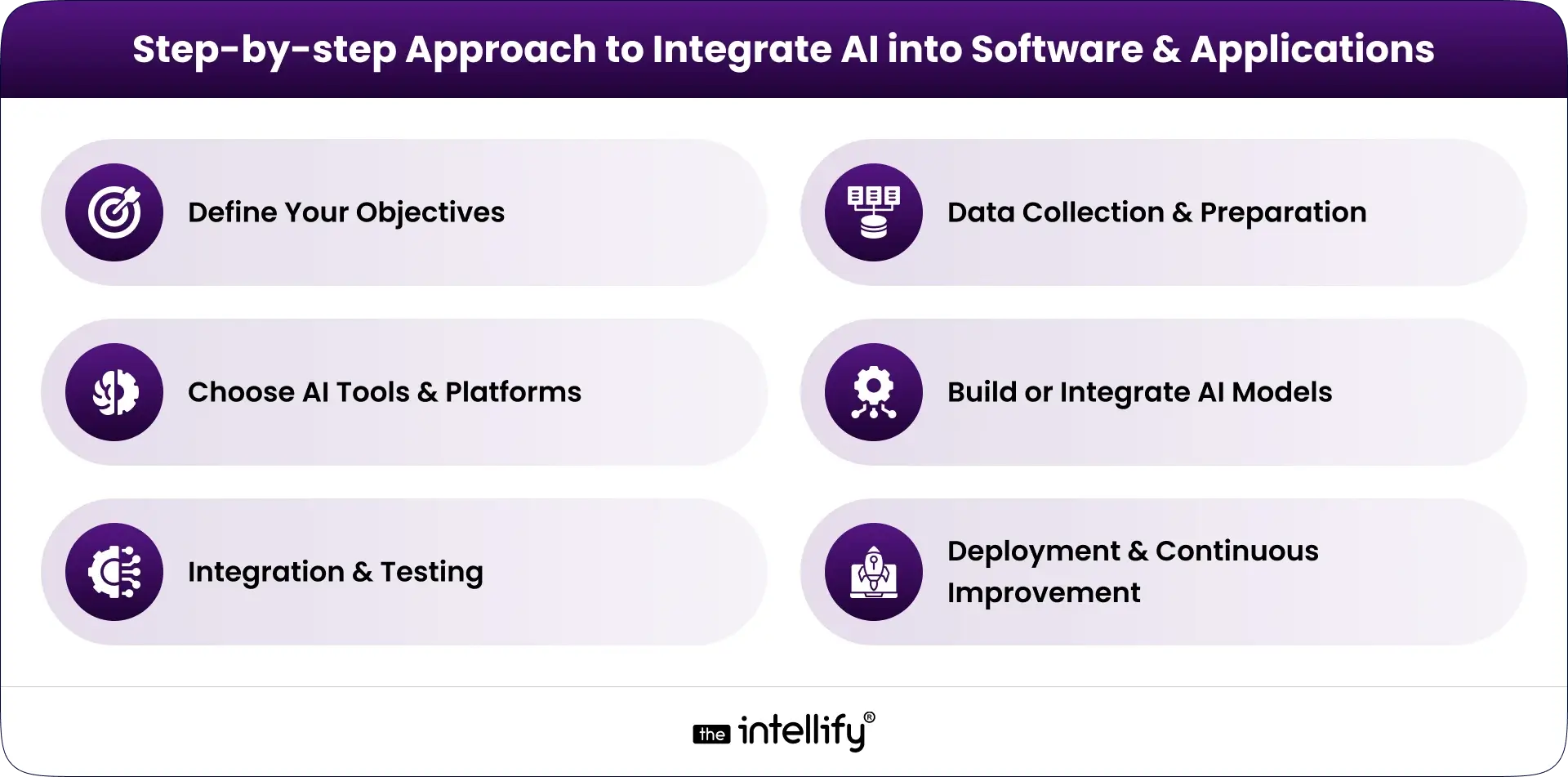
Integrating AI requires careful planning and execution. Here’s a step-by-step approach:
1. Define Your Objectives
Before implementing AI, identify the specific problem it will solve. Are you looking to automate processes, enhance personalization, or provide predictive insights? Clear goals help determine the AI tools and strategies needed.
2. Data Collection & Preparation
AI models rely on high-quality data. Collect relevant datasets, clean them, and label them for training purposes. Without reliable data, AI integration can fail to deliver expected results.
3. Choose AI Tools & Platforms
The choice of AI tools and platforms significantly impacts development speed and effectiveness:
- TensorFlow & PyTorch: Ideal for building custom ML models.
- OpenAI APIs: Useful for NLP, text generation, and code automation.
- AWS AI Services & Google Cloud AI: Cloud-based AI solutions for image recognition, translation, and analytics.
The decision between custom AI models and pre-built APIs depends on project complexity, budget, and timelines.
4. Build or Integrate AI Models
Businesses can either:
- Develop Custom AI Models: Tailored to specific application needs, offering flexibility and control.
- Use Pre-Built AI APIs: Faster deployment and lower complexity, ideal for standard AI functionalities.
Example: A company implementing a customer support chatbot can use pre-built NLP APIs instead of building a model from scratch, saving time and resources.
5. Integration & Testing
Embed AI into your software’s architecture and thoroughly test it. Ensure the AI performs reliably, meets user expectations, and doesn’t disrupt existing workflows.
6. Deployment & Continuous Improvement
Once integrated, deploy AI features and continuously monitor performance. Retrain models with new data, optimize algorithms, and refine features to improve accuracy and usability.
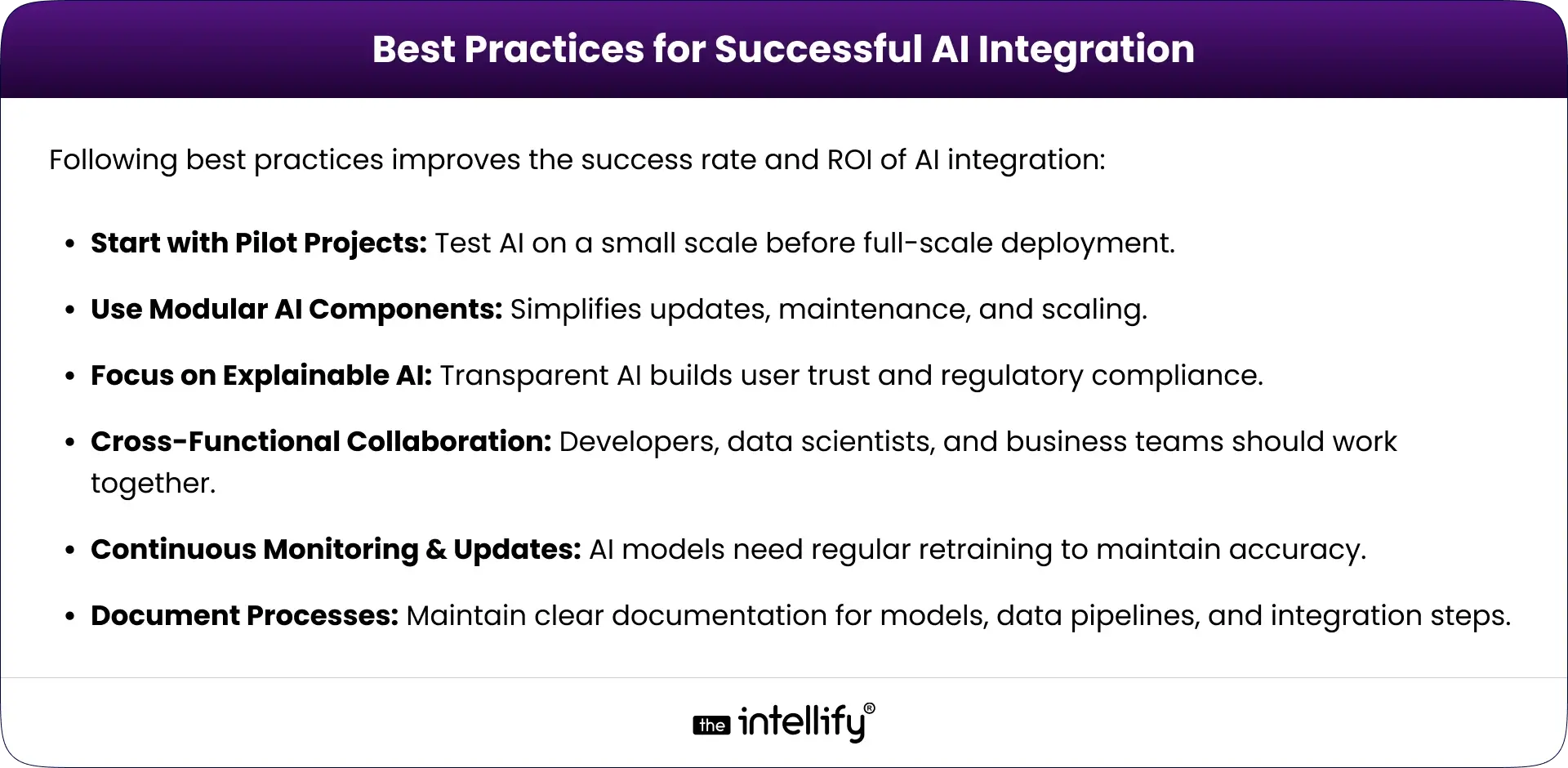
Common Challenges in AI Integration and How to Overcome Them
AI integration can face several challenges, but proactive strategies can mitigate risks:
1. Data Quality & Availability
Challenge: AI models require clean, structured, and comprehensive datasets.
Solution: Implement data governance, standardize data collection, and regularly validate datasets.
2. Model Accuracy & Bias
Challenge: Models can produce errors or biased results.
Solution: Use diverse datasets, conduct regular testing, and retrain models frequently.
3. System Compatibility & Scalability
Challenge: AI models may conflict with existing software or infrastructure.
Solution: Adopt modular AI components, scalable cloud infrastructure, and API-based integration.
4. Security & Privacy
Challenge: Sensitive user data is often used for AI training.
Solution: Encrypt data, limit access, and comply with privacy regulations such as GDPR and HIPAA.
5. Talent and Expertise
Challenge: AI integration requires skilled developers and data scientists.
Solution: Upskill existing teams, partner with AI solution providers, or use pre-built AI tools.
By addressing these challenges, businesses can ensure successful AI implementation and sustainable results.
Real-World AI Application Examples
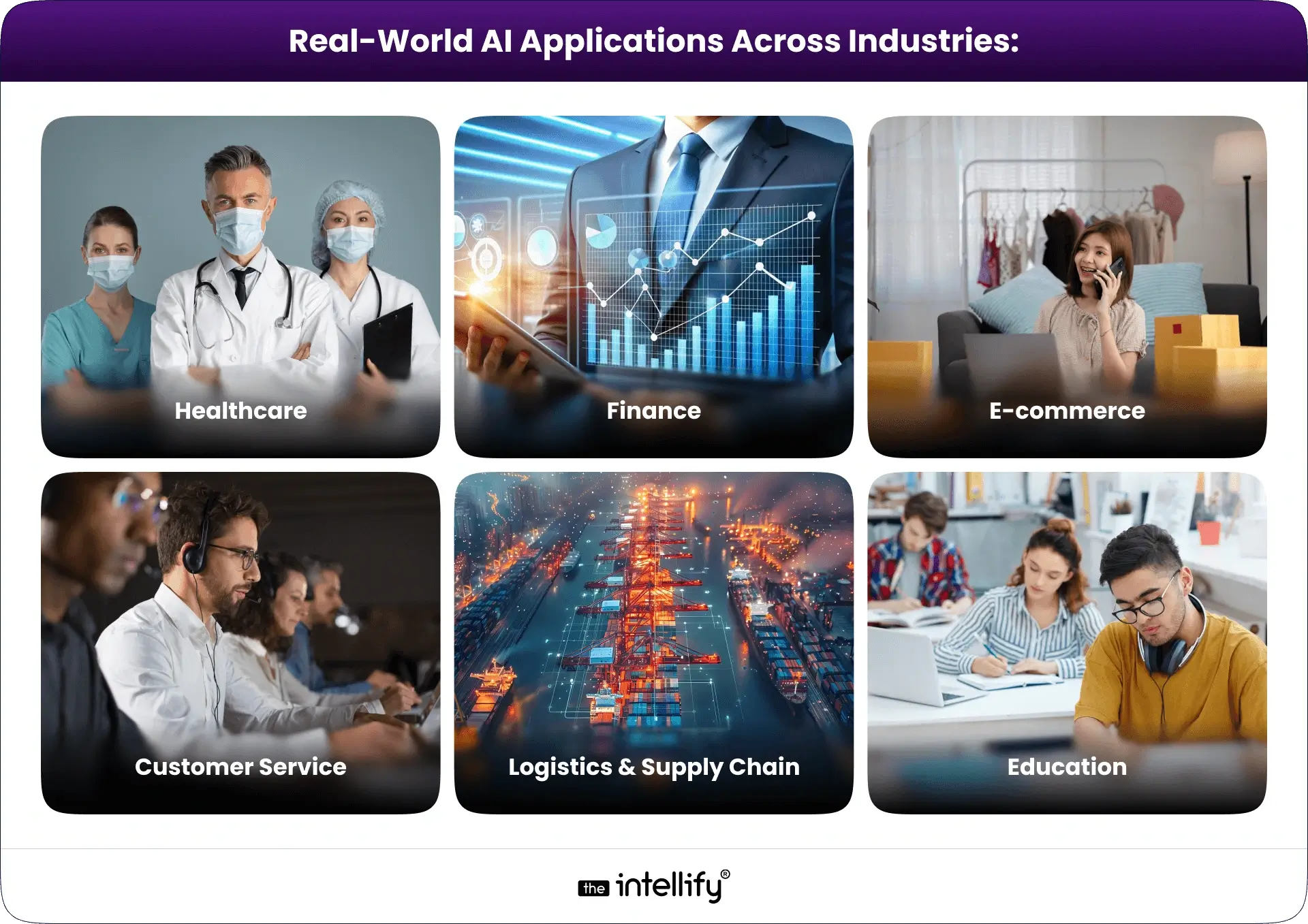
Seeing AI in action helps understand its potential. Here are practical examples:
- Healthcare: AI in healthcare apps predicts patient health trends, automates diagnostics, and supports medical decision-making.
- Finance: AI detects fraudulent transactions, assesses credit risk, and provides personalized investment advice.
- E-commerce: Recommendation engines enhance shopping experiences and drive sales.
- Customer Service: AI chatbots and virtual assistants improve response time, resolve issues efficiently, and reduce operational costs.
- Logistics & Supply Chain: AI optimizes delivery routes, predicts inventory shortages, and improves operational efficiency.
- Education: Adaptive learning platforms personalize lessons, track progress, and provide targeted interventions.
These examples demonstrate that AI integration is not limited to tech giants; businesses of all sizes can benefit from AI-enabled applications.
The Future of AI in Software Development
The future of AI in software is exciting, with trends reshaping development practices:
- AI as a Co-Developer: AI tools can write code, test applications, and suggest improvements.
- Automated Testing & Deployment: AI will streamline quality assurance and CI/CD processes.
- Continuous Personalization: Applications will adapt in real-time to user preferences and behaviors.
- Generative AI & Low-Code AI Platforms: Simplify AI implementation and allow non-experts to create intelligent applications.
- Ethical AI & Explainability: Regulatory compliance and user trust will drive AI transparency and accountability.
Businesses that adopt these trends early will gain a significant advantage in software performance and user engagement.
Final Thought
Integrating AI into software and applications is no longer optional, it is essential for businesses to remain competitive. By following a structured approach, selecting the right technologies, and adhering to best practices, businesses can create smarter, faster, and more personalized applications.
At The Intellify, we specialize in AI integration services that help businesses transform their software with intelligent, scalable, and secure AI solutions. Start your AI journey today and transform your software applications to deliver unmatched user experiences and business efficiency.
Frequently Asked Questions (FAQs)
1. What does it mean to integrate AI into software and applications?
Integrating AI into software means adding intelligent features that allow your application to learn, analyze, and make decisions. This could include automating repetitive tasks, providing personalized recommendations, or improving decision-making with predictive insights. AI integration turns standard software into smarter, more adaptive applications that enhance user experience.
2. Why should I consider adding AI to my software?
AI can significantly improve your software’s efficiency and functionality. It helps automate manual tasks, offers personalized experiences for users, and provides actionable insights from data. By integrating AI, your application can respond faster, make smarter predictions, and deliver a more engaging and valuable experience for users.
3. What are the first steps to integrate AI into my application?
Start by identifying areas where AI can add real value, such as customer support, analytics, or recommendation systems. Then, select the AI technology that best fits your needs, like machine learning for predictions or natural language processing for chatbots. Begin with small pilot projects to test the AI functionality before full-scale deployment.
4. Do I need advanced technical skills to add AI to my software?
Not necessarily. While advanced AI models may require specialized skills, many platforms and tools simplify AI integration for developers. Pre-built AI APIs and cloud-based AI services allow you to implement features like chatbots, image recognition, or data analysis without deep technical expertise.
5. How can I ensure the AI features are effective and accurate?
To maintain accuracy, regularly monitor and test your AI models. Collect feedback from users to identify errors or areas of improvement. Continuously update the models with new data and refine algorithms to ensure the AI adapts to changing needs and delivers reliable results over time.
6. Are there any risks associated with integrating AI into my software?
Yes, integrating AI comes with risks such as potential biases in predictions, data privacy concerns, or incorrect AI outputs. Mitigate these risks by using clean and diverse datasets, implementing strict data security measures, and maintaining transparency in how AI makes decisions. Regular audits and monitoring help keep AI safe and reliable.
